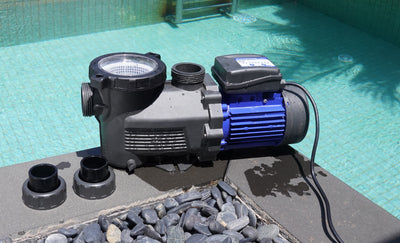11 Common Pool Maintenance Mistakes and How to Avoid Them
Maintaining a pool can seem like a daunting task, but it's essential to keep your pool clean, safe, and running efficiently. Unfortunately, many pool owners make common mistakes that can cause headaches and unnecessary costs. Understanding these errors and how to avoid them will help you enjoy your pool without the added stress.
Here are 11 common pool maintenance mistakes and solutions to keep your pool in top condition.
1. Adding Shock Directly Into The Pool Water
Pool shock is concentrated chlorine, and if added directly to your pool, it can cause damage to vinyl liners, pool walls, and the floor. At high concentrations, it can even bleach clothing or pool liners.
Solution: Always pre-dissolve the shock in a bucket of water before adding it to your pool. This allows the shock to disperse evenly and reduces the risk of damage. Remember to always add chemicals to water, never water to chemicals. Wear protective gear such as goggles, gloves, and a mask when handling pool chemicals.
2. Not Brushing Your Pool
Vacuuming your pool regularly is important, but brushing is equally essential to remove debris, prevent algae buildup, and keep your pool looking pristine.
Solution: Use a pool brush to scrub hard-to-reach areas like behind ladders, the waterline, steps, and corners. Brush at least once a week to maintain a healthy pool environment and prevent algae growth.
3. Using An Automatic Pool Cleaner When You Have An Algae Problem
Automatic pool cleaners are great for day-to-day maintenance, but when you're dealing with algae, they can actually make the problem worse by circulating the algae around the pool.
Solution: Instead of relying on your automatic cleaner, switch to a manual vacuum. Set your filter to "waste" or remove the drain plug to vacuum out the algae without contaminating the water.
4. Ignoring Your pH and Alkalinity Levels
Maintaining balanced pH and alkalinity levels is essential to the health of your pool. Low pH can cause corrosion, while high pH can lead to cloudy water and scale buildup.
Solution: Regularly test your pool water to ensure proper pH and alkalinity levels. Use pH increasers or decreasers and alkalinity adjusters to keep your water balanced and protect your pool equipment.
5. Backwashing Your Pool Filter Too Often
Backwashing cleans the media in your pool filter, but doing it too often can reduce its effectiveness. A dirty filter helps trap finer particles, but overbackwashing can waste water and energy.
Solution: Check the pressure gauge on your filter. If it rises by 10 psi above normal, it's time to backwash. Don’t overdo it—only backwash when necessary to maintain optimal filter performance.
6. Adding Pool Shock Through Your Skimmer
Adding pool shock directly to your skimmer can cause a dangerous reaction, especially when combined with chlorine, which may lead to a buildup of toxic gas and even damage your filter system.
Solution: Always follow the manufacturer's instructions when adding shock, and never pour it into the skimmer. This will help prevent any chemical reactions and potential damage to your filtration system.
7. Shocking Your Pool During The Day
Shocking your pool during the day can lead to the chlorine being burned off by the sun, reducing its effectiveness and wasting your money.
Solution: Shock your pool at night when the sun isn’t as strong. This gives the shock time to work without being immediately depleted by UV rays. Aim for 1 lb. of shock per 10,000 gallons of pool water and ensure you test the water afterward.
8. Not Leveraging the Calcium Hardness In Your Pool Water
Maintaining the correct calcium hardness is essential to keeping your pool water balanced. Too much calcium can cloud the water, while too little can damage pool surfaces.
Solution: Keep calcium hardness levels between 175 and 225 ppm for most pools (up to 275 ppm for concrete and plaster pools). Check calcium levels regularly, especially when filling your pool or after heavy rainfall, and adjust them as necessary.
9. Running Your Pool Filter System Fewer Than Eight Hours a Day
Your pool filter is responsible for removing debris and contaminants from the water. If it’s not running long enough, your pool water can become cloudy and unsafe.
Solution: Run your pool filter and pump for at least 8 hours a day, especially during peak swimming season. This ensures that all the water passes through the filter and stays clean.
10. Neglecting To Test Your Pool Water Weekly
Regular water testing is crucial to maintaining a balanced, healthy pool. If you skip it, you might miss out on small issues that can become bigger problems down the line.
Solution: Test your pool water at least once a week to check for proper pH, alkalinity, calcium hardness, chlorine levels, and other important factors. Taking a sample to your local pool store for a more thorough analysis once a month is also a good idea.
11. Wearing Street Clothes in Your Pool
Wearing everyday clothes in the pool can introduce chemicals, fibers, and dirt, compromising your pool water. Plus, pool chemicals can damage your clothing.
Solution: Always wear swimwear in the pool and leave street clothes outside. This helps keep your pool clean and reduces the strain on your filtration system.
Final Thoughts
While pool maintenance might seem overwhelming at times, avoiding these common mistakes can save you time, money, and frustration. By staying proactive and performing regular maintenance, you'll ensure that your pool remains in great shape throughout the season.
Regular testing, proper chemical handling, and routine cleaning will help you enjoy a clear, safe, and inviting pool all year long. With these simple solutions, you can avoid common pool maintenance mistakes and maximize your pool's lifespan and performance.
For more expert tips and high-quality pool equipment, visit AQUASTRONG for everything you need to keep your pool in top condition.

